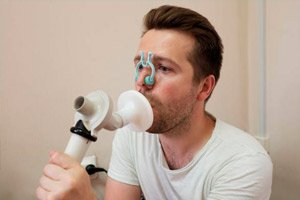
All iLive content is medically reviewed or fact checked to ensure as much factual accuracy as possible.
We have strict sourcing guidelines and only link to reputable media sites, academic research institutions and, whenever possible, medically peer reviewed studies. Note that the numbers in parentheses ([1], [2], etc.) are clickable links to these studies.
If you feel that any of our content is inaccurate, out-of-date, or otherwise questionable, please select it and press Ctrl + Enter.
Exhaled molecules could be key to diagnosing blood cancer
Last reviewed: 27.07.2025

Molecules exhaled through the breath could help detect blood cancer, according to new research from Queen Mary University of London. The findings could help develop a “breath tester” to detect blood cancer, providing a quick and inexpensive way to diagnose the disease. The tool could be particularly useful in areas with limited access to specialist equipment or experts.
In the UK, around 40,000 people are diagnosed with blood cancer each year and around 16,000 die from the disease. Diagnosing blood cancer can be difficult as early symptoms are often non-specific, such as fatigue and weight loss. Diagnosis is usually made using specialist tests such as imaging scans or biopsies, which can be expensive or difficult to access in some areas.
Faster, cheaper and non-invasive testing methods could help diagnose blood cancers earlier, when treatment is more likely to be successful. They could also help monitor the disease and track how well treatments are working.
“Previous studies have shown the value of using breath tests to detect lung cancer. But no one had ever looked at whether blood cancer cells release molecules that could be breathed in, even though the very function of breathing is to exchange substances between the blood and the air,” said Dr John Riches, clinical lecturer at Barts Cancer Institute, Queen Mary University of London.
In a study published in HemaSphere, Dr Riches and his team showed for the first time that a breath test could help detect blood cancer. Using Breath Biopsy technology – a “breath tester” developed by Owlstone Medical – the team collected exhaled breath from 46 people with blood cancer and 28 healthy people. They then analysed the breath’s “chemical fingerprint” by examining tens of thousands of molecular fragments using a technique called mass spectrometry.
Scientists have found that people with high-grade lymphoma, an aggressive type of blood cancer that affects the lymphatic system, have significantly higher levels of certain molecules in their breath than healthy people. Among these molecules are those that form when fats in cells are damaged in a process called oxidative stress, which is known to promote cancer.
The simplicity, affordability and portability of breathalyzers compared to traditional diagnostic methods also means they can be used anywhere in the world. This could be particularly helpful in low-resource areas where there is no access to scanners or pathology specialists and equipment, such as in rural areas or developing countries.
"In the future, instead of sending patients for expensive scans and waiting for test results, doctors will be able to perform a quick breath test in the office and potentially get results in seconds," Dr Riches added.
More research is now needed to develop an effective breath test for blood cancer. The team plans to better understand the biology that drives the production of the volatile molecules found in patients’ breath and determine which specific types of lymphoma can be most reliably detected by the method. This will help create more specific and sensitive tests, which the researchers hope will reduce the current breath collection time from 10 minutes to a few seconds.
